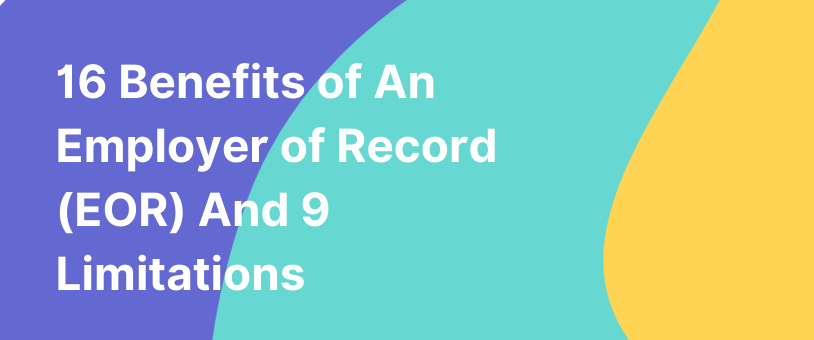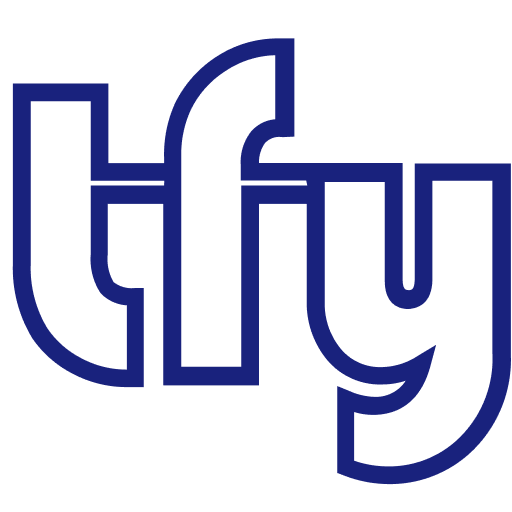What is an EOR?
An employer of record (EOR) is a company that acts as the legal employer for employees who are hired by a client company. The EOR assumes responsibility for the administrative and legal aspects of employing the workers, such as payroll, benefits, tax compliance, and compliance with employment laws.
The EOR typically charges a fee for these services, and the client company maintains control over the workers’ day-to-day tasks and responsibilities. EORs are commonly used by companies that want to hire workers in countries where they don’t have a legal entity, or that want to outsource certain HR functions.
16 Benefits of an EOR Solution for your Business
1. Easier growth and expansion
An EOR provider acts as the employer for a worker or group of workers on behalf of another company, allowing the hiring company to quickly and easily add new staff without incurring the time and cost of hiring and managing employees directly.
This can be especially useful for companies that are expanding into new markets or locations, or that have a high demand for temporary or contract workers.
An EOR provider can also handle many of the administrative and legal responsibilities associated with hiring and managing employees, allowing the hiring company to focus on its core business and growth strategies.
2. Talent freedom, more innovation
Using an Employer of Record (EOR) provider can allow a company to recruit top talent from anywhere in the world, which can lead to increased innovation and growth.
With an EOR provider, a company can hire workers from any location, even if it does not have a physical presence in that location or the legal ability to hire workers there.
This can open up a global pool of talent and allow the company to find the best candidate for a position.
Hiring global talent can bring new perspectives and ideas to the company, which can lead to increased innovation and creativity. This can be especially beneficial for companies in industries where staying ahead of the competition is critical to success.
Having a diverse workforce can also help a company better serve a global market and expand into new regions.
3. Cost-effective solution
Using an Employer of Record (EOR) provider can be a cost-effective solution compared to setting up your own entity or doing all the HR functions yourself, especially when hiring in other countries.
An EOR provider handles many of the administrative and legal responsibilities associated with hiring and managing employees. This can save your company time and money, as you won’t need to invest in creating and maintaining a legal entity or adding HR infrastructure in the country where the workers will be hired.
An EOR provider may also have relationships and expertise in the local labor market, which can help the hiring company navigate local labor laws and regulations and avoid costly mistakes. .
This can be especially important when hiring in countries with complex or unfamiliar employment laws.
4. More time to focus on your business
With an EOR taking on many of the administrative and legal responsibilities associated with hiring and managing employees, you will free up time and resources to focus on core business operations and strategies.
When you outsource HR functions to an EOR, you can focus on doing what your business does best, instead of dealing with all the headaches of expanding your team with a remote workforce.
5. Increase hiring and onboarding speed
Using an employer of record provider can streamline the hiring process and allow your company to quickly and easily add new staff, without incurring the time and cost of setting up a legal entity or HR infrastructure in the country where the workers will be hired.
An EOR provider will also likely have expertise in the local labor market, which can help you identify and hire qualified candidates quickly.
This can be especially important for companies tech companies, where demand for developers is high, or for companies that need to quickly scale their workforce.
6. Facilitate employee onboarding
Using an employer of record can make the onboarding process easier and more efficient for your company and your new employees.
An EOR provider can handle tasks such as setting up payroll and benefits, completing employment paperwork, and setting up necessary tools and orientation. This can reduce the time and effort required to onboard new employees.
For the employee, an EOR provider can provide support and guidance during the onboarding process, including answering questions and providing information about the company and its policies. This can help the employee feel more confident and prepared as they start their new job.
7. More innovation and diversity
An EOR provider can help a company hire workers from a wide range of backgrounds and locations, allowing it to build a diverse workforce. This can be especially useful for companies that are expanding into new markets or regions, as an EOR provider may have relationships and expertise in the local labor market.
Hiring workers from diverse backgrounds can bring new perspectives and ideas to the company, which can foster creativity and innovation. A diverse workforce can also help a company better serve a global market and attract a diverse customer base.
Promoting diversity and inclusion can also have positive effects on employee morale and retention, as employees may feel more valued and supported in a diverse and inclusive workplace.
8. Conserve already limited resources
An Employer of Record (EOR) provider can be useful for companies that have limited HR resources. The services an EOR offers provide a cost-effective and efficient solution for companies that do not have the time or expertise to handle all these tasks themselves.
For example, a small or startup company may not have the resources or infrastructure to hire and manage employees directly, but may still need to bring on staff to support its growth. An EOR provider can provide the necessary HR support and expertise, allowing the company to focus on its core business.
An EOR provider can also help a company that is expanding into new markets or regions, where it may not have the necessary HR infrastructure in place. If you have limited HR resources, your HR team likely doesn’t have the tools or time to work on global hiring.
9. Facilitate legal payroll management abroad
An employer of record manages payroll and often pays employees in their local currency, which can help ensure compliance with local labor laws and regulations.
Paying employees in their local currency can also save money on exchange fees, as the EOR provider may have better rates or access to local payment systems.
This can be especially beneficial for companies that are hiring workers in multiple countries, as it can reduce the overall cost of managing payroll.
Paying employees in their local currency can also help your organization save money on currency conversion fees. When you pay employees in a foreign currency, you must first convert the funds from your native currency into their foreign currency. This can result in significant transaction costs, particularly if you’re making many payments to employees in different countries. By using an EOR that can pay employees in their local currency, you can avoid these costs and save money.
Paying employees in their local currency can also help you maintain compliance with local employment laws and regulations. Some countries have specific requirements regarding the payment of wages, and an EOR that is familiar with these requirements can ensure that the organization is compliant with these laws. This can you avoid penalties and other legal complications that may arise from non-compliance.
10. Ensure contractors are paid on time accurately
An EOR provider has the expertise and specialized systems in place to manage global payroll, which can help reduce the risk of errors or delays for contract workers.
EORS can deploy clearly defined contracts that specify the scope of work, the payment rate, and the payment schedule, as well as any other relevant terms and conditions. Having a clear contract can help avoid misunderstandings or disputes about payment later on.
An employer of record typically also has a secure online platform for invoicing and payments. EORs also provide guidance and support for using their payment system.
EORS also have support teams that regularly check their payment system to ensure that payments are processed correctly. They may also follow up with contractors to see if there are any issues or delays. Regular communication and follow-up can help ensure that contractors are paid promptly and avoid disputes or misunderstandings.
11. Reduced legal risks
Using an Employer of Record (EOR) provider can reduce legal risk. An EOR provider takes on compliance with local and federal labor laws and regulations and handles any legal issues or disputes around employment that may arise.
By outsourcing these responsibilities to an EOR provider, a company can reduce its exposure to legal risk and avoid potential penalties or lawsuits.
An EOR provider may have the expertise and specialized knowledge in employment law and can help ensure that the hiring company is in compliance with relevant laws and regulations.
An EOR provider may also have relationships with local authorities and legal resources, which can help quickly resolve any legal issues that may arise.
12. Less bureaucracy
Using an Employer of Record (EOR) provider can result in less bureaucracy.
By outsourcing HR tasks to an EOR provider, a company can reduce the amount of bureaucracy and administrative work required to manage employees.
An EOR provider will also have systems and processes in place to streamline HR tasks and reduce the amount of paperwork and documentation required. This can save time and resources for your company.
If your company has complex and outdated policies and procedures around hiring and paying employees, an EOR can instantly modernize your outdated procedures.
Organizations with too much HR bureaucracy may also have a lack of transparency and communication. For example, decision-making on hiring remotely may be bottlenecked by the CEO and not involve enough input from employees or other stakeholders. This can create a lack of accountability and trust and can make it difficult for employees to understand the organization’s goals and strategies.
Using an employer of record allows your company to outsource HR functions, allowing you to focus on more important business operations and strategies.
13. Ensuring proper worker classification, insurance, and licenses
An EOR ensures that workers are properly classified as employees or independent contractors and that they have the necessary insurance and licenses for their job.
Classifying workers correctly is important to avoid potential legal issues and ensure that workers receive the appropriate protections and benefits.
An EOR provider has the expertise and specialized knowledge in employment law and can help ensure that workers are classified correctly according to local and federal regulations.
An EOR provider may also have relationships with insurance providers and licensing authorities, which can make it easier to obtain the necessary coverage and licenses for workers. Overall, using an EOR provider can provide a cost-effective and efficient solution for ensuring proper worker classification, insurance, and licenses.
14. Immigration compliance
An Employer of Record (EOR) can be useful for immigration compliance because the EOR is responsible for ensuring that the workers they hire are authorized to work in the country where they will be employed.
The EOR will handle all of the necessary paperwork and employment verification processes, which can help ensure that your company is in compliance with immigration laws.
This can help you avoid penalties and fines associated with hiring unauthorized workers. Additionally, by using an EOR, you can focus on core business operations and leave the employment compliance issues to the EOR.
15. Tax compliance and reduction
An Employer of Record (EOR) can help with tax compliance by ensuring that the company and its employees are properly registered and that all necessary taxes are being withheld and paid.
For example, the EOR will work with local tax authorities and will ensure that the correct amount of taxes are withheld from employee paychecks.
This can help you avoid penalties and fines associated with non-compliance with tax laws. Using an EOR can also help you avoid double taxation because the EOR is typically familiar with local tax laws and can advise your accounting team on how to structure tax-efficient operations.
For example, the EOR may be able to help your finance team take advantage of tax treaties or other tax exemptions that can reduce the overall tax burden.
16. No co-employment agreement
Working with an Employer of Record (EOR) allows a company to avoid a co-employment agreement because the EOR becomes the legal employer of the workers that the company hires. This means that the workers are considered employees of the EOR, rather than the company itself. While this can sound a little concerning, it can be advantageous for a number of reasons.
First, it can help you avoid the potential liability and legal complications that can arise from co-employment agreements. For example, if a worker is considered a joint employee of your company and another company (Like a PEO), and they get injured on the job, you may be held legally responsible for the injury.
By using an EOR, you can avoid this risk and leave the employment-related issues to the EOR.
Second, using an EOR can also your company avoid the administrative burden of managing employee benefits and payroll. The EOR will handle these tasks, which can save time and money.
5 benefits for employees being hired through an EOR
1. Work anywhere
Being hired by an Employer of Record (EOR) allows your employee to work anywhere they want because the employee does not have to be physically located in the same place as your office, and they can work from anywhere as long as they have a reliable internet connection.
This can be especially useful for workers who are seeking flexible work arrangements or who want to work in a location that is different from where the company is located.
2. Receive full-time employee benefits
Being hired by an Employer of Record (EOR) allows your employees to receive full-time benefits because the EOR usually provides these services as part of their plans and pricing.
This means that your remote hires can receive the same benefits as a regular full-time employee of the company, such as health insurance, vacation time, and retirement savings plans. EORs will also ensure the benefits you offer comply with local labor laws in the countries you hire from.
Because the EOR is responsible for managing these benefits, you will not have to worry about dealing with the administrative details of enrolling in and accessing these benefits.
This can make it easier for your remote team members to focus on work while enjoying the same level of benefits as other full-time employees of the company.
3. Secure, compliant contracts
Employer of Record (EOR) providers typically have secure, compliant contracts for their employees because they are experienced in handling employment-related issues and are familiar with the local employment laws and regulations.
This means that the contracts they provide will typically include all of the necessary legal provisions and protections to ensure that the employees are treated fairly and are in compliance with the relevant employment laws.
The contracts will typically be written in clear and concise language, which makes it easy for employees to understand their rights and responsibilities.
4. Easy onboarding and remote working tools
An Employer of Record (EOR) can help your remote hires with onboarding and setting up the tools they need to do their job while providing support and guidance throughout the process.
The EOR will typically have experience in onboarding remote workers and can provide assistance with tasks such as setting up the necessary equipment and software, providing training on the company’s policies and procedures, and answering any questions that the employee may have.
The EOR may also be able to provide advice on how to set up a productive and effective remote work environment, which can help ensure that the employee is able to perform their job effectively.
5. Get paid in their local currency
An Employer of Record (EOR) can pay remote employees in their local currency, which can be beneficial to an organization using the EOR’s services in a number of ways.
First, paying employees in their local currency can help ensure that they receive the full value of their wages, as they will not have to worry about exchange rate fluctuations or other potential losses associated with receiving payment in a foreign currency. This can help you maintain good relationships with its employees and ensure that they are satisfied with their compensation.
Using an EOR that can pay employees in their local currency can provide a number of benefits to an organization, including ensuring that employees receive the full value of their wages, saving money on currency conversion fees, and helping to maintain compliance with local employment laws.
9 Limitations to using an Employer of Record
1. You have less control
The main limitation of using an employer of record is that it can result in a loss of control over the workers that are hired. Because the employer of record is the legal employer of the workers, they have a stake on important matters such as hiring, firing, taxes, and compliance.
This means that your company may have less control over these aspects of the employment relationship.
2. You do not own the working relationship
When using an EOR, your company does not “own” the working relationship with employees in the same way that you would if you hired the workers directly.
While this can be a convenient way to hire workers in certain situations, it does come with the limitation of less control over the employment relationship. The company may have less flexibility in how it manages its workforce and may be subject to the decisions and policies of the employer of record.
3. Too many employees in one country increases Permanent Establishment risk
Permanent establishment (PE) is a tax term that refers to a fixed place of business through which a company carries out its business activities. If a company has a PE in a country, it may be subject to taxation in that country on the profits that are earned through the PE.
When a company uses an employer of record, it can potentially increase the risk of being determined as having a PE in the country where the workers are located. This is because having too many employees in one country can be seen as evidence of a significant presence in that country, which can trigger the PE rules.
If a company is determined to have a PE in a country, it may be subject to taxation in that country on the profits that are earned through the PE. This can result in higher tax liabilities and even double taxation for the company and can also complicate the tax planning process.
When using an employer of record, it is important to carefully consider the number of employees that will be hired in each country to avoid triggering PE rules and incurring additional tax liabilities.
4. No control over payroll processes
When a company uses an employer of record, the employer of record is responsible for handling all aspects of payroll for the workers that are hired. This means that the company has no control over the payroll processes, such as calculating and issuing paychecks, withholding taxes, and complying with local employment laws.
The company may not have as much flexibility in how it manages its payroll and may have to rely on the employer of record to handle any changes or issues that arise. This can potentially result in a loss of efficiency and can also increase the risk of errors or compliance issues.
5. More perceived distance between employer and employee
Because the employer of record is the legal employer of the workers, the workers may see the employer of record as their primary employer, rather than the company that is actually using their services.
This perceived distance can have several negative effects. For example, the workers may be less loyal to the company and may be less motivated to work hard and achieve the company’s goals. They may also be less likely to identify with the company’s culture and values, which can impact their job satisfaction and overall performance.
6. Changes in company culture
The employer of record may have different policies and practices than your company, which can create inconsistencies and confusion for the workers. For example, the employer of record may have different policies around work hours, vacation time, and other employment issues, which can create confusion and resentment among the workers.
Furthermore, the employer of record may not have the same level of commitment to the company’s culture and values as the company does. This can lead to a lack of alignment and can make it difficult for the company to maintain a consistent and positive culture across its workforce.
7. Potential loss of talent
Because an EOR becomes the legal employer of your new hire, it can potentially result in lost talent if issues arise.
The employer of record may not have the same resources and expertise as your company when it comes to retaining talent. This can make it more difficult for you to retain top talent, which can result in a loss of talented hires over time.
8. Rejecting a potential candidate
An employer of record may decline to hire a potential candidate due to legal issues or complications with local employment laws. The employer of record is responsible for complying with all local employment laws and regulations, and they may decide not to hire a candidate if they believe that doing so would put the company at risk of violating these laws.
For example, if a candidate does not have the necessary documentation or qualifications to work in the country where the job is located, the employer of record may decline to hire them in order to avoid any potential legal issues.
9. Potential issues and delays
If a new employee does not have the necessary documentation or qualifications to work in the country where the job is located, the employer of record may have to delay the onboarding process in order to obtain the necessary paperwork and ensure compliance with local laws.
The employer of record may also occasionally encounter difficulties or delays in processing payroll and providing benefits to the workers. They may have to deal with complex local tax and labor laws when working with a new hire. This can result in delays with pay and benefits for the workers, which can create frustration and resentment, especially if a new hire doesn’t get paid on time.
EORS are a great option for growing companies
Overall, working with an employer of record can help with talent recruitment, increase retention, improve the use of consistent practices, offer helpful support to both the company and its employees, and delegate HR tasks so that the company can focus on its business.
Recommended EOR providers
Remote is a robust and modern platform for remote-first teams. EOR, contractor management, payroll, benefits, and more.
Oyster is an intuitive platform that allows you to hire, pay, and care for a global team in more than 180 countries. EOR, contractor management, payroll, benefits, and more.
TFY has features for applicant tracking, freelance management, payroll, and more in a single platform. The platform supports diversity hiring and Corporate Social Responsibility (CSR) initiatives.
Lano is both a B2B & B2C platform. Businesses can use it to process global payroll, hire remote talent and manage contractors, while employees and freelancers can benefit from its payslip service, invoicing app, multi-currency wallet, and more.





